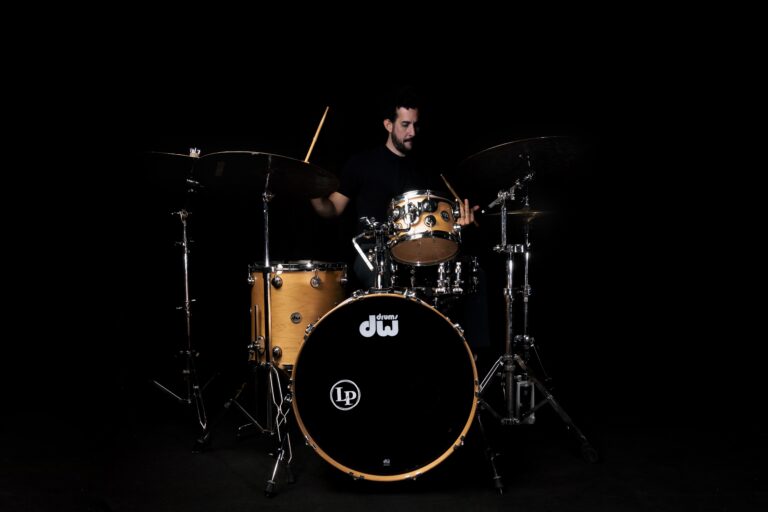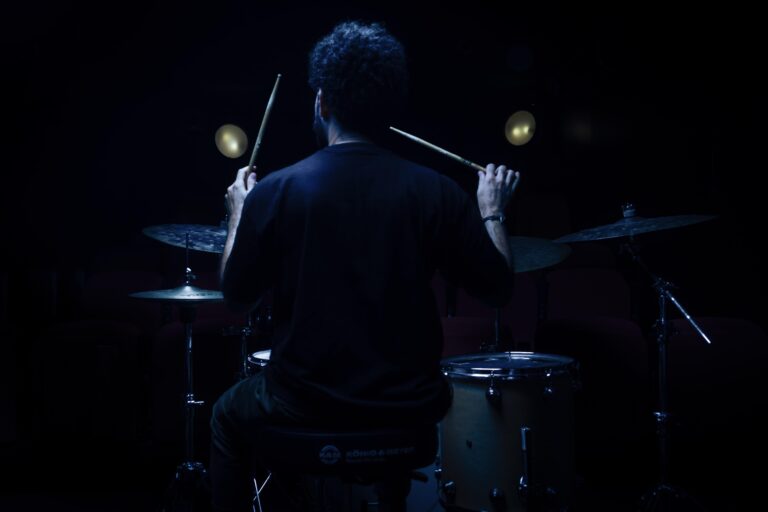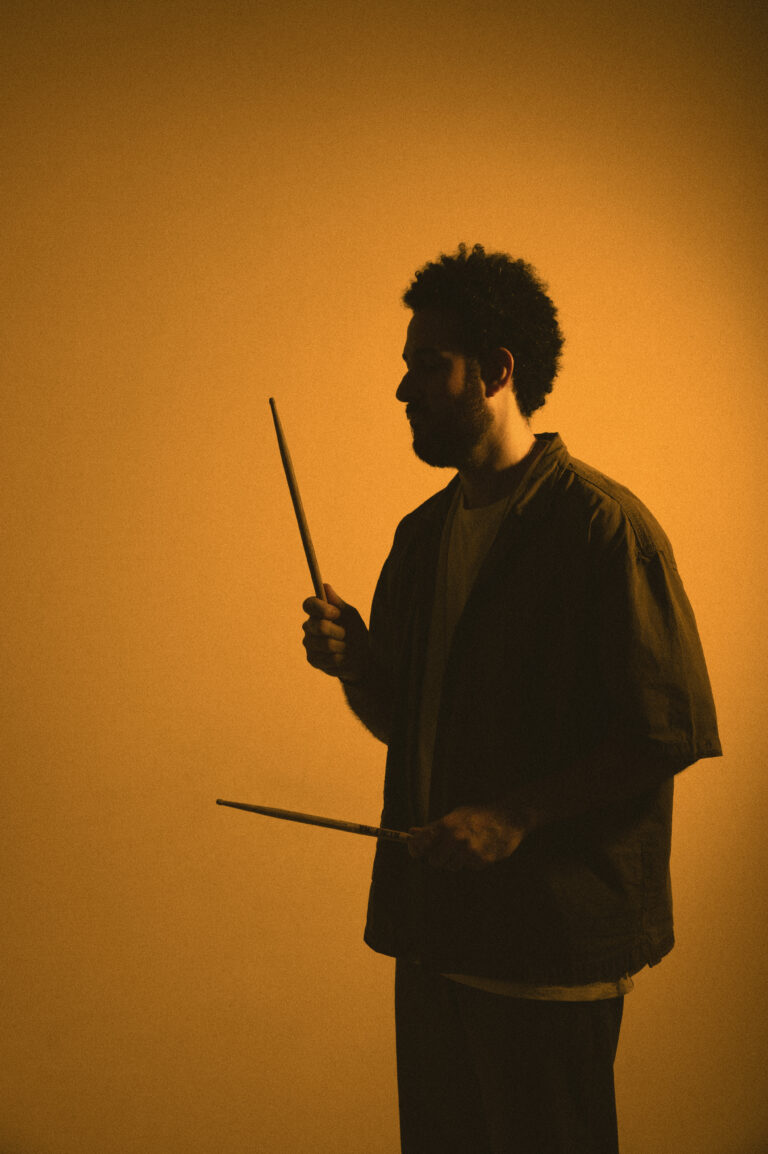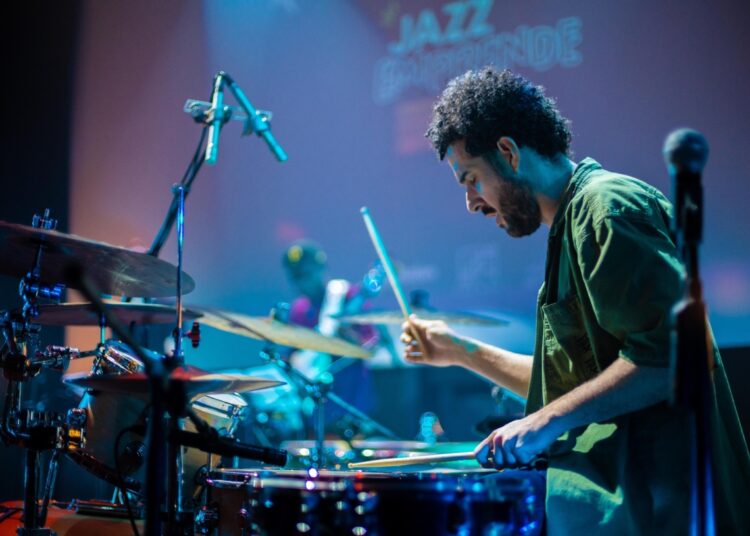“Come on, gentlemen, I’m leaving. Something’s happening (Algo pasa).” This is the phrase, spoken by Cuban drummer Ruly Herrera, that opens the new album by the alternative jazz band Real Project. The album represents a new beginning for the group, which is celebrating its 12th anniversary in 2025, with a different composition than the previous album, but faithful to its sound and the vision of its founding leader.
Algo Pasa, the new album by Ruly Herrera and Real Project, was released on digital platforms on June 6. It has nine tracks composed by Herrera, where music serves as a pretext to channel personal emotions, celebrate shared values and capture a clear, resonant and stimulating idea: there’s Real Project for a while.
The group’s lead drummer is now joined by musicians Ángel Toirac on piano, Christian Figueredo on trumpet and bassist Osniel Regal. These young and talented performers accompany him in the new phase of the project, following the impressive album Mutación, which Ruly shared with former members Jorge Luis “Yoyi” Lagarza and brothers Rafael and Rasiel Aldama.
Now Real Project reaches this point in its journey with a mature proposal, one that Ruly Herrera has been patiently pondering since the pandemic. Algo Pasa is an album of resistance, from a group that undoubtedly continues to bring meaning and brilliance to the Cuban music scene.
“Let’s see if this turns out well here,” the musician tells me on the other end of the video call. “Anyone would think we’re 7,000 kilometers apart: you in Norway and me in Havana,” I quip as a joking icebreaker, since we’re both in the same city. But, faced with the impossibility of arranging a live meeting, we decided to have the conversation this way.
From his family home in Havana, Ruly speaks calmly about his new album, everything that motivates him to continue creating, Cuba and its music scene, what he hopes for the future and a present fraught with challenges.
What’s happening with Real Project on this album?
I think Real Project reaffirms itself with it, despite the current circumstances and the fact that I’ve had to watch previous members of the project leave. It’s an album that reinforces the group’s brand, its identity.
With Algo Pasa we go back to the beginning, when I started Real Project with my album Mal Tiempo (Producciones Colibrí, 2015) — the band didn’t even exist yet — and I had absolute control over the production of the material, something that forced me to be attentive to every part of the process.
The journey was both beautiful and challenging, because it’s about maintaining the level of a band that’s widely followed on the national scene and which until the previous album featured faces that were hallmarks of the lineup.
The faces that people knew — Yoyi Lagarza, Rafael Aldama, Rasiel Aldama — became brands that the public identifies with Real Project. So I know that, by not seeing them, fans may wonder what’s new, what it will sound like, if it will be at the usual level. We’ve already played some pieces in several of our recent performances, and I’m very confident about what we’ve done. We’ve emerged stronger from this process and I feel I can continue on the path with anyone who comes to play with me.
I’ve been working on Algo Pasa since the pandemic. When we started preparing the previous album — Mutación (Bis Music, 2023) — I was composing, brainstorming ideas, meeting a lot here in the studio and themes kept coming out. Before we knew it, we had 20 themes, of which we chose 10 or 12 to make Mutación and 8 or 9 were saved.
Then, in the post-pandemic stage, I continued composing; these themes comprise the nine tracks on the album. Several years went by and that allowed me to evolve my vision of what I want to do and what sound I want to champion. I’ve wanted to pay homage to and revive indigenous Cuban rhythms and styles, always giving them the shape, uniqueness and sound of Real Project.
I really enjoyed being able to perform a guajira — “Una guajira en la ciudad” — and also the theme “Caminos” with Síntesis, with North African rhythms. Or “Fiesta,” where I fuse Brazilian and Mozambican music.
I’d never worked with Síntesis before. I’ve been a huge fan of theirs since I was a kid, due to their importance in the history of music. I did work with Eme (Alfonso) before; we’re contemporaries, even though she studied at the Alejandro García Caturla Conservatory and I studied at the Manuel Saumell Elementary School. We always ran into each other at parties and concerts; we had many friends in common. Since we became professional artists, we’ve had the opportunity to work together several times: she even performed live with Real Project and I played as her drummer, but we’d never collaborated on an album.
“Caminos” was originally a completely instrumental song, but when I finished it and started listening to it, I imagined voices and singing with that music in the background. Since the theme has a semi-ancestral, African vibe, I thought, “If Carlos and Síntesis wanted to collaborate, that would be awesome!” So I mentioned it to Eme and they agreed instantly.
“Gibara-Temazcal-Tulum” is a love story, a piece I wrote for my wife during the pandemic. They are three words that, during our lockdown, we used to say to each other like a spell that calmed us. In Gibara, during a film festival, we met and became friends. The temazcal is an ancestral steam bath ritual we did in Mexico; it was a powerful experience we shared together. Tulum (Yucatán) is also a special place for us, where we spent some wonderful moments. So I wanted to pay tribute to all those wonderful moments we had together.
You mentioned before that for a while you didn’t want to miss anything that was happening in the city. You live the cultural life of the capital city. How do you see the Havana scene right now, what’s happening, what’s circulating within it?
We’re living in a time where there’s a lot of talent circulating, people with a high level of talent, maturity and creativity, despite their youth. In contrast, with the possibilities of access to information that exist today, I think they should try to break away from the established norm and seek more authenticity in their style.
The other factor is the space and the economy. I believe Cuba deserves to be back on the map, despite all the political and economic circumstances of all kinds. We need people to come see us, to discover us, to try to help us Cubans who are here.
Cuban musicians also want to be on the international festival circuit. We’ve already experienced it: there were times when people came looking for indigenous, innovative things to take them around the world. I feel the scene is quite depressed.

How would you define these 12 years of Real Project?
They’ve been years of endurance.
A good word to describe a theme.
Yes, really. It’s like the saying goes: “This isn’t about speed, but about endurance.” You have to have that resilience and not let the contamination get the better of you. Moving forward with the idea, if you believe in it.
How do you remember your band’s debut?
That was one of the happiest moments, professionally speaking, of my life. I thought I had already made it big; we did it with great enthusiasm. The rehearsals were incredible, with Rey Guerra Jr., who at the time was X Alfonso’s bassist. We came from Natural Trío, with Emilio Martini, with all the experimental work we did with him.
After producing Mal tiempo, Rey and I agreed to form a band to champion all that music. We were a duo and played, for the first time, at the Café Miramar. It was a very nice concert, and for us it was like playing at the Blue Note in New York. I wasn’t “the drummer” anymore; it was my band that was there, on stage, very immature, of course, but it was something pure.
What dreams did you have at that time? Have they come true?
Many have, yes. For us, the most important thing was that the project be recognized; to be a band that, wherever we went and whenever we announced a concert, would be packed, that it be accepted, and that in the future we would influence new generations.
Ángel Toirac recently told me he was with the kids from the art schools in eastern Cuba and that they all know the themes from Real Project. We should do something to go there and perform.
Obviously, the biggest goal we’d like to achieve is to be on the international market, on the world’s jazz festival circuits. We haven’t achieved that yet. We’ve been to a few festivals, but we’d like to tour internationally, to be around the world. We’re working toward that goal.
How do you go about your compositional work? Do you have a method?
Yes, I can say I do. I spend the whole day whistling melodies and humming, receiving information from all sides. If something interests me, I record it in a voice memo and then add layers: what could be the bass line, the piano, the rhythm. Sometimes I do it on the drums.
When I’m in my most intimate place, with the most suitable conditions, where I have the piano, that’s where most of the themes come from. I’ve had pretty good piano training since school and that helps me a lot when composing. But a theme can come out anywhere and in any way.

I remember a song that’s on Mutación, “Return to Havana,” which came to me on a plane. We were returning from a tour, and the melody was drilling into my head until I couldn’t take it anymore. I went to the airplane bathroom, hummed everything I had in my head and when I got home I made the demo. That’s how crazy that process was.
You’ve identified Robert Glasper as one of your most far-reaching influences. What did it mean to you to bring him to Havana for the first time to be part of the first edition of Jazz Emprende, an event you’re hosting?
Robert Glasper is the total inspiration for Real Project, responsible for us achieving everything we’ve achieved. I remember that, during the Mal Tiempo stage, an album he released with his band, Robert Glasper Experiment. That blew our minds. We’d already been listening to other stuff, but with this — and the work of saxophonist Casey Benjamin — we realized that was the sound we wanted to hear. He’s been a tremendous influence that has stayed with us all these years.
When my wife — Marta Deus, CEO and co-founder of the delivery company Mandao — and I came up with the idea of doing Jazz Emprende, I said to her, “Can you imagine bringing Robert Glasper to Havana and opening this event with a figure like that?” She replied, “Why not?”
Some time passed and I remembered that Robert Glasper is married to Yiyi Sánchez, a Cuban woman I had met a few years earlier. So I wrote to her privately on Instagram, told her about the idea and they accepted. We initially wanted to hold the event in September, but we couldn’t and had to postpone it to February, which was the best thing that happened to us because that month is ideal for this event.
The idea for Jazz Emprende was born, first, from that desire for my wife and I to do something together, that would unite our two worlds. She’s a great entrepreneur, she has a specific vision of the business world in Cuba, and I, on the music side, jazz. And look, we didn’t rack our brains too much over the name and the result was Jazz Emprende: a space where the two worlds interact, blending the business of the music industry with the enjoyment of that live art.
That has to do with what I was saying: Cuba needs a new look. We had our youthful years under Obama, but after Trump’s first term, we were completely disconnected. I think there’s tremendous potential here, incredible musicians who could perfectly pursue sensational careers outside of Cuba without having to leave permanently. That has been the goal of Jazz Emprende and it has worked out somewhat.
We’re only two years old, but we’re incredibly happy that, for example, Jason Olaine, vice president of programming for Jazz at Lincoln Center, was with us this year and will be bringing Alain Pérez to perform a concert there. So, in a way, the event is serving as a connection. Directors of spectacular jazz festivals, industry people and musicians also come to interact and give masterclasses.
So, Jazz Emprende is in good shape and will have a third edition.
Yes, we’re already working on it.
And beyond Robert Glasper, what other influences did you draw on for that initial idea that became Real Project?
A big part of what made me such a fan of Robert Glasper is that he plays with the drummers I love most in life and who have influenced me the most, of course: Chris Dave and Mark Colenburg. Imagine, a musician with whom you conceptually empathize, who also plays with your favorite drummers.
Through those drummers, I began to discover new sounds within the drum kit, to broaden the spectrum of the instrument’s formation a bit. With their music, I was able to expand my sonic universe and break it down. I liked that.
We didn’t break new ground with Real Project, but I can tell you that we were among the first to bring those new influences to the national scene, at least. Then I began to find my own story, because I didn’t want to become a copy of them either.
Another of those who have influenced me the most worldwide is Herbie Hancock and his drummers — Vinnie Colaiuta is one of the great masters. I enjoyed accessing all that information.
A few months ago, I was watching a lot of videos by José Luis Quintana “Changuito.” He’s one of the greats; any Cuban percussionist who doesn’t listen to him is lost. You have to go to Changuito, no matter what. That also helped me a lot when approaching this album and exploring all the Cuban rhythms present in the material.
What value do you attribute to being the composer, performer and producer of your own work?
I love producing music, arranging, composing, and I love that up until now I’ve been able to take control of the productions. On previous albums, I did it with Yoyi; I’ve always been very involved in the process.
But don’t get carried away: I’d love to have the chance to work with a music producer on my next album — and I would have liked for it to be in this one — who would take everything that comes out of my head and give it a different shape, who would teach me other things. I’m terrified of repeating myself or of music that could have been better being forgotten.
I’d love to find that producer and not for him to be Cuban, because I’m looking for a totally different perspective.

There are so many Cuban creators scattered around the world right now. Have you planned new works with former bandmates like Yoyi Lagarza or the Aldama brothers?
Not yet. I think they’re still in the initial, settling-in stage, although Rafa has been away from Cuba the longest: three years. Yoyi has been two years away, and Rasiel, one. I think they’re still at the stage where they need to establish themselves more, to become more solid in the places they’ve decided to stay, but I don’t rule out the possibility that, at some point, this band will reunite on stage.
With Rafa, I’ve had the opportunity to play; we’ve done concerts in Miami. With Rasiel, we once talked about some dates I came up with in Europe, but with Yoyi, we haven’t thought about doing anything yet. It’s time for each of us to fully explore our own path, so that what we can put together will be stronger.
Why was music for Ruly Herrera?
From a very young age, at home. My dad is a drummer, my mom is a music history teacher, my brother is a pianist. I’m the youngest and since I was born I’ve seen my house as a temple of music.
My dad was the director of his band — Los Dan. They rehearsed here, they did everything here. Regardless of the talent and aptitude they saw in me for percussion and music, I was incredibly impressed by watching my dad play the drums. I looked at that instrument and saw myself as a drummer. I imagine it all happened naturally. When I was the right age, my mom, who was a teacher at Saumell, encouraged me to take the entrance exams and that’s how the career began.
The musical information my brother gave me was incredible. He’s six years older than me, and any CD or cassette he borrowed at art school back then, he’d bring home and sit with me in my room to listen to it.
I was about 13 when my brother brought over a record by Tony Martínez and The Cuban Power. Julio Barreto, Gonzalo Rubalcaba and Julito Padrón were on it. It’s called Maferefun (1999); I listened to it and was amazed.
And for as long as I can remember, my parents took me to Jazz Plaza. I remember seeing Herbie Hancock, Michel Camilo, all the greats. I’ve been fortunate to have access to all the tools possible to develop the musical background I have.
Talking about Algo Pasa is also talking about maturity. Today, Real Project has an undeniable presence on the Cuban jazz scene. What does jazz represent for you?
Jazz is my life, it’s my language, my idiosyncrasy, my nation. Jazz is like the water I drink. Without that form of expression, I think I would be a very unhappy person. I would like to live off music and playing jazz all the time.
Do you see the future of Real Project in five or ten years?
I’m always dreaming and working toward a better Real Project. I’m working so that, perhaps, in the next interview I can show you my schedule of concerts around the world. For now, this album deserves a theater. We’ll see if we can have a formal release in October.










